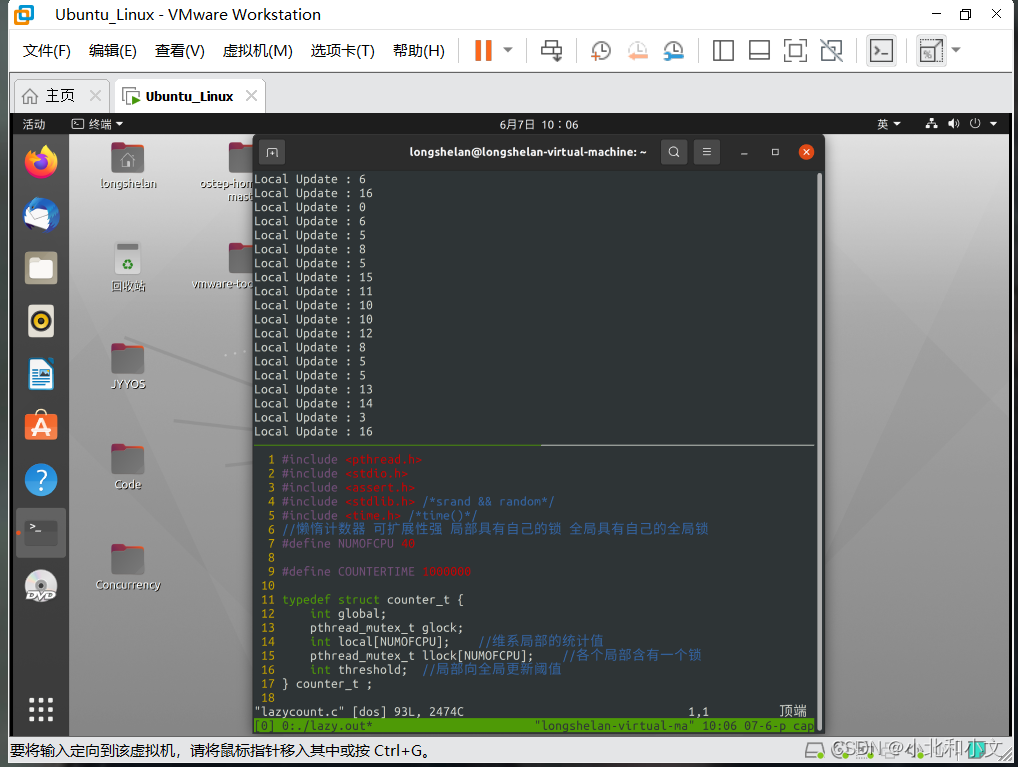现代计算机的多处理器结构催生出一系列并发程序,为了更好地在多处理器上运行,要利用锁的机制,保护临界区,避免race condition导致程序出错。
因此锁的思想在整个并发编程中都比较适用,在更新critical section的时候先请求锁,更新完再释放。并发计数器也是同样的思想,只是为了更好利用多处理器、提高扩展性,并发计数器中以懒惰计数器为著名。
全局计数器维护真正的全局值,但是各个cpu上都运行着一个局部的计数器,局部之间自我通信,速度快到媲美单核性能(单个速度,多个局部加起来那就是单核的许多倍了)。只有当局部计数器达到一定的阈值时才会更新全局计数器。
代码如下 C语言 Linux下编译:gcc -pthread lazycount.c -o lazycount.out 运行:./lazycount.out
#include <pthread.h>
#include <stdio.h>
#include <assert.h>
#include <stdlib.h> /*srand && random*/
#include <time.h> /*time()*/
//懒惰计数器 可扩展性强 局部具有自己的锁 全局具有自己的全局锁
#define NUMOFCPU 40
#define COUNTERTIME 1000000
typedef struct counter_t {
int global;
pthread_mutex_t glock;
int local[NUMOFCPU]; //维系局部的统计值
pthread_mutex_t llock[NUMOFCPU]; //各个局部含有一个锁
int threshold; //局部向全局更新阈值
} counter_t ;
counter_t *lazy;//生命一个全局counter 创建多个线程来操作它
void init(counter_t *c, int threshold);
void update(counter_t *c, int tid,int amt);
int get (counter_t *c);
void * mythread(void * arg) ;
int main(int argc, char *argv[]) {
srand((unsigned int) time(NULL));
lazy = (counter_t *)malloc(sizeof(counter_t));
init(lazy, 1000);
pthread_t p[NUMOFCPU];
for(int i = 0; i < NUMOFCPU; i++) {
pthread_create(&p[i], NULL, mythread, &i);
}
for(int i = 0; i < NUMOFCPU; i++) {
pthread_join(p[i], NULL);
}
printf("global is %d\n", lazy->global);
}
void * mythread(void * arg) {
int *tid = (int *) (arg);
int temp = 0;
//进行计数
for(int i = 0; i < COUNTERTIME; i++) {
temp = random() % 17;
update(lazy, *tid, temp);
}
}
//init 为全局和局部都设置自己的锁
void init(counter_t *c, int threshold) {
c->global = 0;
assert(pthread_mutex_init(&c->glock, NULL)==0);
for(int i = 0; i < NUMOFCPU; i++) {
c->local[i] = 0;
assert(pthread_mutex_init(&c->llock[i], NULL) == 0);
}
c->threshold = threshold;
}
//update 更新指定pid线程局部的值 如果到达阈值则更新全局的值
void update(counter_t *c, int tid,int amt) {
pthread_mutex_lock(&c->llock[tid]);
c->local[tid] += amt;
printf("Local Update : %d \n", amt);
if(c->local[tid] >= c->threshold) {
pthread_mutex_lock(&c->glock);
c->global += c->local[tid];
printf("Global Update : %d \n", c->local[tid]);
pthread_mutex_unlock(&c->glock);
c->local[tid] = 0;//局部置零
}
pthread_mutex_unlock(&c->llock[tid]);
}
//get 获取global值
int get (counter_t *c) {
pthread_mutex_lock(&c->glock);
int val = c->global;
pthread_mutex_unlock(&c->glock);
return val;
}
运行效果如下:

























 4800
4800











 被折叠的 条评论
为什么被折叠?
被折叠的 条评论
为什么被折叠?








